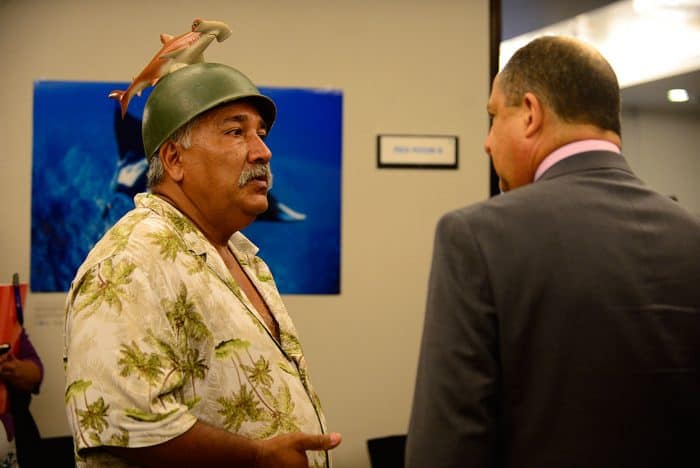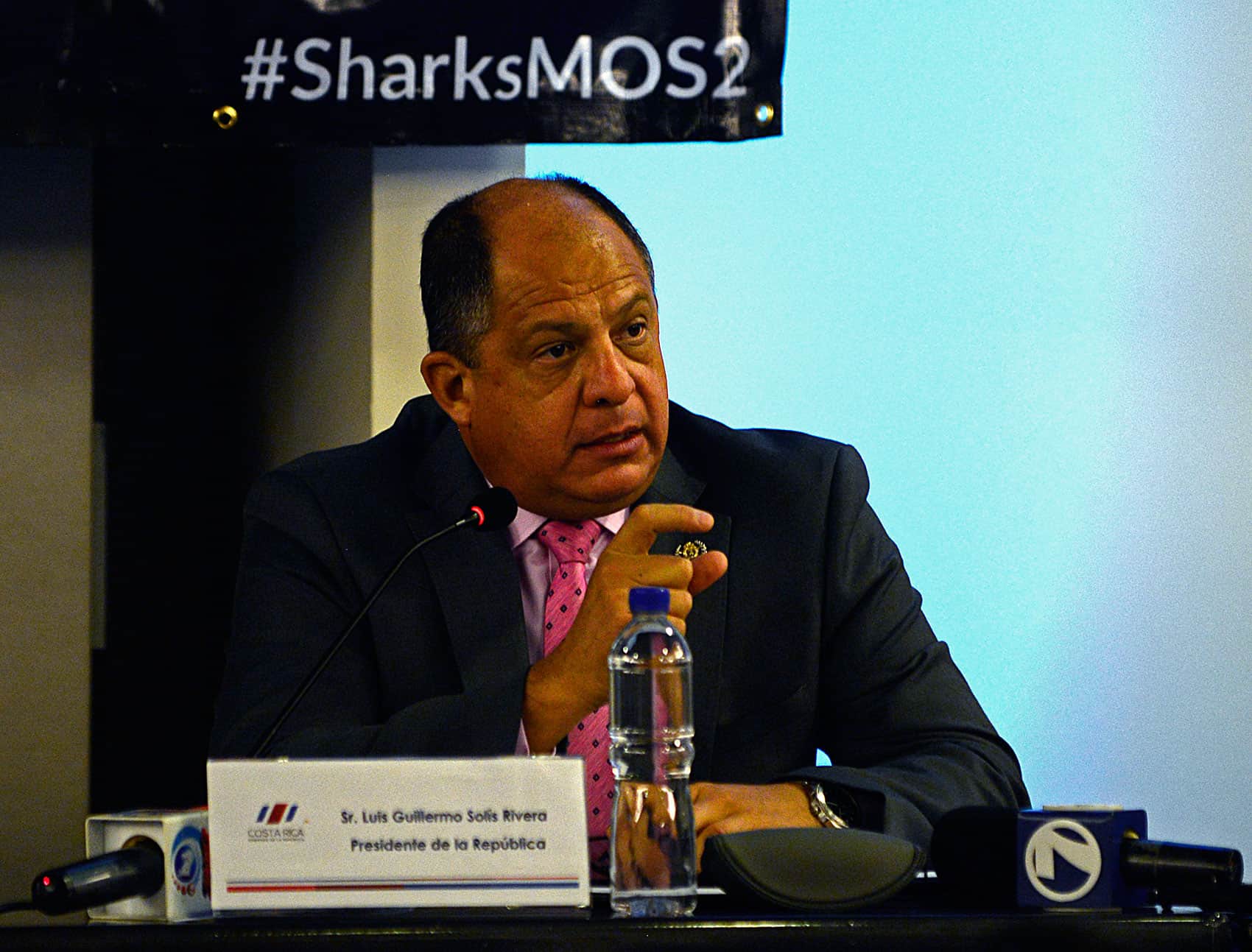Costa Rica President Luis Guillermo Solís stood Wednesday morning before a room full of the world’s biggest shark admirers and admitted that some might consider him the animal’s biggest adversary. Weeks earlier Solís had been named “Shark Enemy of the Year” by an international conservation group, and now his country was hosting a convention designed to promote the international conservation of threatened shark species.
“I’m bringing up [this award] because I don’t want to skirt around it,” Solís said, “and I’m not being ironic, I really think that it shows that the debate we are immersed in is ruled by a false dichotomy … a contradiction that doesn’t exist between conservation and commerce.”
For attendees of the convention, the second meeting of parties to the Memorandum of Understanding on the Conservation of Migratory Sharks, Solís’ remarks elicited mixed reactions. To some, the president’s statement came as a relief, a deviation from his earlier statements that he would not “choose a shark over a fisherman.”
Lo bueno, el Presidente LGS reconoce ahora que no se debe ver la conservación separada del uso de recursos. CR debe implementar esa visión.
— Marco A Quesada Alpízar (@marbolada) February 17, 2016
“The good news is that President [Luis Guillermo Solís], now recognizes that you can’t look at conservation separately from resource use,” Marco Quesada, the director of Conservation International Costa Rica, tweeted during the speech. “Costa Rica needs to implement this vision.”
But for others, Solís’ address failed to dispel concerns about the government’s ocean policies, and instead underscored the entrenched political tug-of-war between conservationists and fishing groups. Both sides accuse the government of being overly sympathetic to the other cause.
The president’s speech immediately followed a general meeting of the Memorandum’s delegates where 38 countries and the EU unanimously agreed to incorporate 22 species of threatened sharks and rays into Appendices I and II of the Memorandum.
While specific conservation measures are not outlined in the Memorandum, signatories are required to make an effort to curtail downward population trends in any of the species listed that move through their territories.
Costa Rica’s delegates endorsed the inclusion of all of the proposed species, including the five shark species found in Costa Rican waters.

The government’s position on the listing of threatened shark species was only clarified a week before the convention. In the months prior, environmental groups had expressed concerns that Costa Rica would vote against the species inclusions — despite being chosen as the host country for the meeting based on the country’s past record of supporting international shark conservation.
Their worries stemmed from written agreements made between the government and fishing groups last year, in which the Solís administration promised to no longer “propose or support” the inclusion of commercially valuable shark species in international conservation conventions. Three of the species Costa Rica supported adding to the memorandum — silky sharks and two species of thresher sharks — are regularly fished in Costa Rican waters.
The fishing agreements were made public in October after conservation groups released a letter addressed to them by the Presidency Minister outlining the promises the government had made with the fishing sector.
The government and fishing groups say the ramifications of this agreement were blown out of proportion by NGOs and the media due to the strict wording used in the letter. The government says the true intent of the agreements was not to renounce species protections as the letter indicated, but rather to conduct studies and collect data to make more informed decisions.
“An ideology may seek to construct a reality, but it is not reality,” Solís said, likely in reference to conservationists’ desire to limit fishing based on current knowledge of shark declines globally. “In order to understand the truth we need information, and we need to get that information from scientists.”
Both environmentalists and fishing groups agree that more local studies are needed, but recent arguments have centered around how to manage the fisheries now. Fishing industry leaders say they would be willing to comply with restrictions only once new studies are completed, while environmental groups support enforcing additional fishing regulations until a study proves them unnecessary.
Despite the warnings of a “false dichotomy” between conservation and commerce, Solís’ speech this week still referred often to those two factors as competing interests. In the end, he managed to stoke concerns among both fishing and environmental groups of an imbalance between the government’s dual responsibilities.
Fishing leaders have jumped on the president’s support for the inclusion of silky and thresher sharks into the Memorandum as evidence that his administration overly favors conservation.
“The fact is that we fishermen want these resources to be around forever and we want to conserve,” Mauricio González, Executive Director of the National Longline Fishing Sector, told The Tico Times. “But decisions like this show that the government is only considering conservation and not the needs of fishermen.”
Conservationists say the opposite, and point to two major government decisions made during Solís’ time in office. The first is the government’s green-lighting of two shipments of shark fins in 2014 and 2015. At the time, the administration cited the importance of the income to the coastal communities where they came from.
The second is a bill proposed by the Solís administration last year that would prolong shrimp trawling in Costa Rican waters, a practice banned by the Constitutional Court in 2013.
Randall Arauz, president of the conservation group Pretoma, said Solís’ speech at the shark meeting this week was worrisome.
“The president’s speech still shows that he is stuck with the idea that fishing regulations act against the public interest,” he told The Tico Times. “With that attitude something like the shark fin scandal could happen all over again.”






